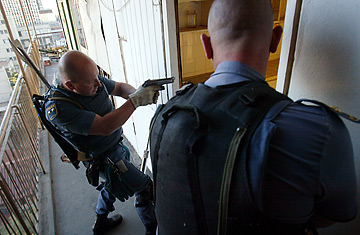
Members of the Johannesburg SWAT raid an appartment of a suspected drug dealer in the city suburb of Hillbrow, Johannesburg, South Africa.
The city was built on greed, a patch of thorn-tree farmland without a river that became Southern Africa's largest city in three years after gold was discovered in 1886. Today, it is crime that shapes the geography and architecture of Johannesburg. Downtown, once the country's financial hub, is a ghost town, abandoned in the 1990s by corporations fleeing to the leafy northern suburbs, leaving this city of 5.7 million without a heart. Gang violence makes whole black townships such as Alexandria into no-go areas even for police. And driving the lanes of the northern suburbs can feel like cruising a giant tropical bobsleigh, so hemmed in are the roads by towering security walls. (The 10-ft. walls also mean every suburban home in Joburg has the same view — the sky — and families are more likely to know their neighbors by sound rather than by sight.)
Crime is a constant, but its methods are always changing. A new fad among Joburg's armed robbers is dynamiting ATMs and then picking up whatever cash survives the blast. The newest deterrent on offer from security firms is notices nailed to clients' gates promising to track down any burglars to the townships and kill them. This month's fresh twist to the anguish of millions of crime victims is mass dog poisonings: police say thieves are hitting several streets in a night, killing guard dogs by tossing them meat laced with a poison known as "two step" — because the animal that swallows it takes two steps and drops dead — then returning a few nights later to burgle the homes.
South Africa plans to host the world's premier sporting event, the soccer World Cup, in 2010, seeing a successful tournament as marking the new South Africa's coming of age on the international stage. But the traditional challenges facing any country hosting the Cup — getting venues built and transport infrastructure up to speed, figuring out what to do with unruly Brits — are overshadowed by a single terrifying headache: How many murdered soccer fans is too many?
Such extreme security certainly dampens the city's nightlife. After dark, you never walk, only drive (doors locked, windows up), and you're legally entitled to disregard all traffic signals if you feel in danger. You stick to an area you know and — what gives lie to Joburg's claim to be a racially integrated city — this mostly means staying within the confines of your own mostly white or mostly black suburb. Many are put off by the complexity of the act of going out itself. Just to leave my friend's house, I have to set four alarms and three internal motion detectors, pull metal trellis gates over the doors and windows, unlock and re-lock three separate doors, activate the external electric fence, turn on the external lights and activate the external motion detectors.
Instead, like most of the city, I stayed in Tuesday night to watch the Golden Globes. And right as they're about to announce best film, the lights go out. I'd been vaguely aware of an approaching rain cloud outside. But as I creep onto the terrace in the darkness, I realize Joburg is in the midst of an immense summer thunderstorm. Jagged white forks illuminate the clouds. Deafening thunderclaps roll across the city. And the rain is coming off the roof like a waterfall. I can feel the city freshen around me, washing off the dust and sweat of the day. And suddenly I'm aware that everybody's watching the same show. Over the security wall and beyond the razor wire, I hear excited shrieks from my neighbors as they edge out into their gardens. Standing on a chair to peek over the wall, I can see that out in the road, people are abandoning all of their normal security rules and splashing through the puddles. From the sounds coming from a house a street over, somebody's having a rain party.
Then, almost as one, it hits us. Our defenses are down. The telephone is dead. And with no power, we have no burglar beams, no alarms and no electric fences. It's a thief's paradise. I have the sudden feeling that I'd glanced out of an airplane window and seen an engine die. Evidently my neighbors do too — the pleasant hubbub and coos switch sharply to shouts of concern and anger. And then, one by one and quickly, we turn inside, double-lock our doors and pull the "rape-gate" across our bedroom doorways. It's going to be a fitful night's sleep. But for a moment there, when people came together under the same African sky, Joburg forgot its walls, and it was beautiful.
